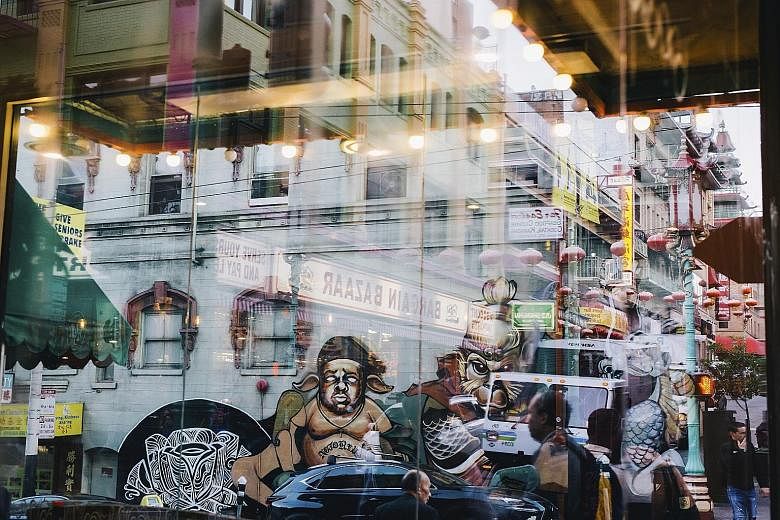SAN FRANCISCO • The restaurant Eight Tables, which opened last October, offers a US$225 (S$310) tasting menu featuring a caviar dumpling.
If you think the outlet is in a swanky mall or chic district, it is in San Francisco's Chinatown, where the community is at a crossroads - trying to fend off gentrification while welcoming change.
As leases run out and merchants retire, entrepreneurs are opening upscale restaurants and shops, while ageing enterprises strive to remain relevant.
In San Francisco, more than 14,000 residents, mostly Chinese, live in densely packed quarters in Chinatown's 20-block core, according to the Chinatown Community Development Centre.
Many are low-income and elderly, renting single rooms in buildings with health and safety violations that are twice the city's average, according to the centre's report last year.
Despite these challenges, civic improvements are helping to enhance the neighbourhood, including mural art, cleaner alleys and better, affordable housing. A much-anticipated Chinatown Station subway hub is expected to open next year.
"If it weren't for the determination of the community and a seat at City Hall, Chinatown would have been long gone by now," said Mr Aaron Peskin, a member of the San Francisco Board of Supervisors representing the precinct.
In addition, proponents believe the enclave of 900 family-owned businesses is shifting in the right direction. But change happens slowly.
By next year, at least two Chinese-owned cocktail bars and two Chinese restaurants will open.
A performance venue, Clarion Music Performing Arts Centre, recently presented Sparring With Beatnik Ghosts, a poetry night that included Chinese rap.
People complain that old shops are closing, but evolution is good, said Ms Betty Louie, a Chinatown landlord whose family has owned property there since the 1940s. "Some think we should remain a ghetto, but people are coming in and trying to do something different and that is cool," she noted.
Notable chefs in Chinatown are garnering rave reviews, turning the zone into a culinary hot spot.
Restaurateur and executive chef George Chen yearns to see the heyday return.
His Eight Tables was recently named by Time magazine as one of 100 of the World's Greatest Places. It is the crown jewel of China Live, his new US$20 million-plus, four-level contemporary Chinese food and beverage emporium that houses restaurants, cocktail lounges and a retail shop.
Mr Brandon Jew said he chose Chinatown for his Mister Jiu's restaurant because he felt the need to carry on the tradition of Chinese cooking after his grandmother died.
"It was a challenge and a responsibility," he said. "I draw my strength from the amazing Chinese restaurants before me such as Four Seas and Kan's. I want to be a part of that Chinatown legacy."
At the same time, retail is becoming more sophisticated.
It took three years for Mr Chen's wife to curate her shop at China Live. Merchandise includes house sauces, portable tea sets in zippered cases and handmade paring knives.
Still, Chinatown's advocates are concerned. The area is filled with too many voices that seem unable to agree, said Ms Sue Lee, historian and former head of the Chinese Historical Society of America. "There is no uniform strategy for improvement to move forward together," she said.
"There is little culture left in terms of Chinese movies and opera, but it has to survive."
Within Chinatown are 200 distinct family and district associations, which are much more than social clubs - they are strong voting blocs. In the 1800s, new immigrants made a beeline for their family associations to secure housing and employment. The largest is the Chinese Consolidated Benevolent Association, with about 2,000 members.
For decades, Chinese residents were prohibited from buying property, so associations bought real estate in Chinatown. Today, the majority of the buildings are owned by the associations, partnerships and individuals, Ms Louie said.
"The associations do incredible things," Mr Peskin said. "Their saving grace is that they are all profoundly interested in the continuity of the community."
Some members of the younger generation are also keeping the flame alive.
Mr Kevin Chan, for example, has worked at Golden Gate Fortune Cookies, owned by his mother, since he was nine. "I'm not rich," he said. "I am giving back to Chinatown and the city of San Francisco. I'll be here until I die."
NYTIMES

